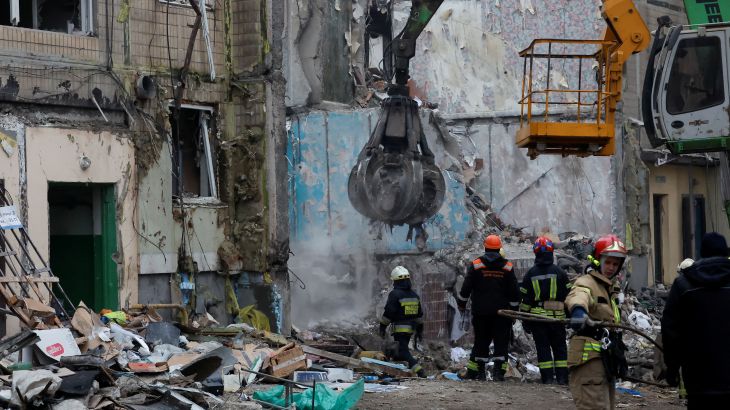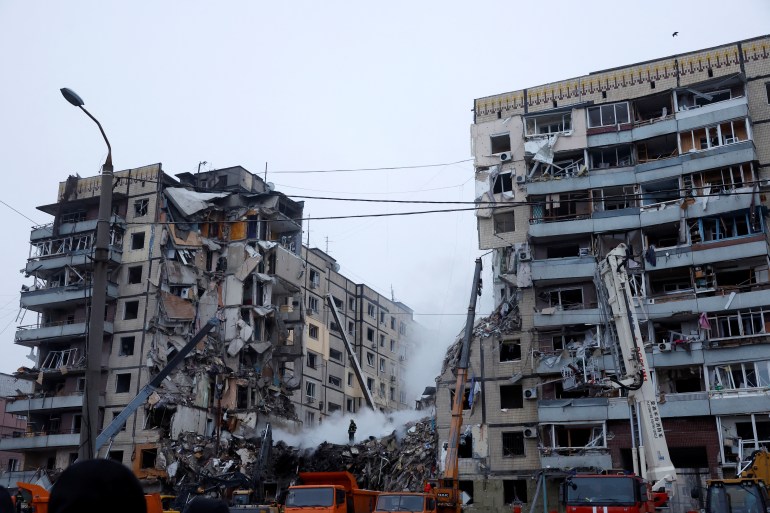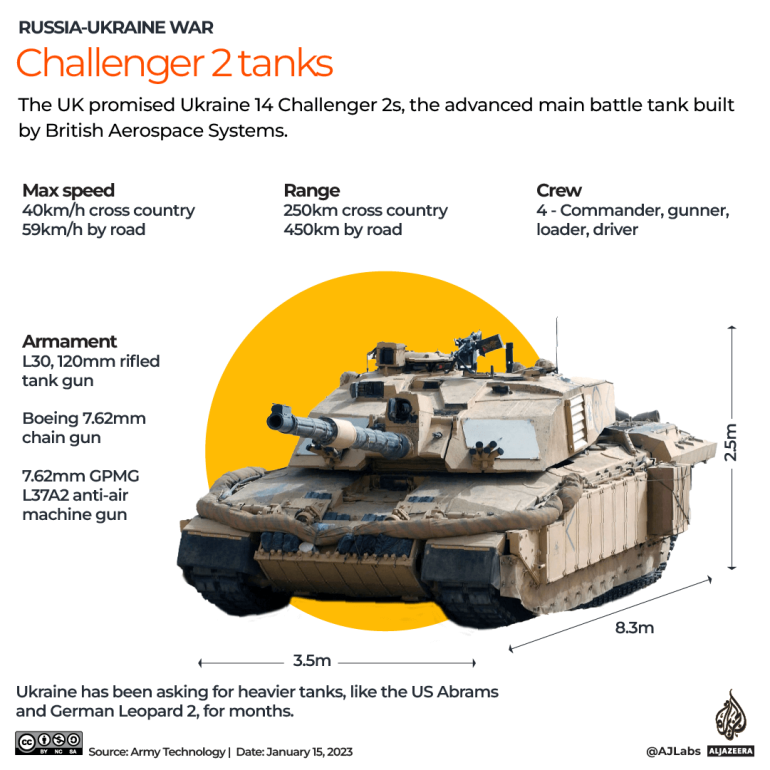Ukraine’s Dnipro reels as Russia, Belarus hold military drills
One of the war’s deadliest attacks rocks the central Ukrainian city as Russia denies responsibility.

The toll from a devastating missile strike in Dnipro has risen as more bodies are pulled from the debris of one of the deadliest attacks since Russia’s invasion of Ukraine began 11 months ago.
Residents gathered on Monday to watch as cranes removed collapsed sections of the Soviet-style residential building that was ripped open by the strike in central Ukraine two days earlier.
Keep reading
list of 3 itemsRussia’s frenzied fight for Ukraine’s strategic eastern towns
Does the battle for Soledar mark a new phase in the Ukraine war?
Ukraine’s emergency services said 40 people had died, including three children, and 34 people were still unaccounted for.
Kyiv blamed Moscow for the attack, but the Kremlin said Russian forces were not responsible and pointed to an unsubstantiated theory circulating on social media that Ukrainian air defence systems had caused the damage.
“The Russian armed forces do not strike residential buildings or social infrastructure. They strike military targets,” Kremlin spokesman Dmitry Peskov said, suggesting Kyiv’s air defences knocked a Russian missile off course.
Ukrainian President Volodymyr Zelenskyy said late on Sunday that search operations would go on as long as necessary and condemned Russia’s “cowardly silence” over the attack, but the chances of finding more survivors appeared slim by Monday afternoon.
Russia, Belarus hold military drills
The rising cost of the strike came as Russia and its close ally Belarus held joint military drills.
Belarus, one of the only countries that has supported Russia without question throughout the conflict, allowed Moscow’s forces to launch their invasion from Belarusian territory in February.
Its defence ministry said the air force exercises would involve joint “tactical” flights and every airfield in Belarus would be involved.
“The exercise is purely defensive in nature,” Pavel Muraveyko, first deputy state secretary of the Belarusian Security Council, said in remarks released on Sunday by the defence ministry.
Al Jazeera’s Ali Hashem, reporting from Moscow, said the drills “will concentrate mainly on patrolling [and] supplies during operations”.
“They have been described as defensive drills, not offensive ones, so this is generally the perspective that’s being discussed whenever this issue of the drills is being spoken about,” Hashem said.
“But there are many concerns with the role Belarus is playing with respect to the war [and] whether this is going to have an impact,” he said.

Meanwhile, UN atomic watchdog chief Rafael Grossi was expected in Ukraine on Monday to deploy observer missions at nuclear power plants across the country. Securing and protecting nuclear sites have been a key concern throughout Russia’s invasion.
“I’m proud to lead this mission to Ukraine, where we’re deploying in all of the country’s NPPs [nuclear power plants] to provide assistance in nuclear safety and security,” he said on Twitter.
In another sign the war is having effects far beyond Ukraine, German Defence Minister Christine Lambrecht resigned on Monday after months of criticism over Berlin’s stuttering response to the war in Ukraine.

As the nearly year-long war drags on, Ukraine is pressing its Western backers to supply its forces with tanks, in particular the German-designed Leopard model.
Britain this weekend pledged 14 Challenger 2 tanks to Ukraine, which would make it the first Western country to supply the heavy tanks Kyiv has been calling for.
Peskov predicted they would have little effect in Ukraine’s war effort.
“These tanks are burning and will burn,” the Kremlin spokesman said.
NATO Secretary General Jens Stoltenberg said in an interview with German media on Sunday that “recent pledges for heavy warfare equipment are important – and I expect more in the near future.”
Poland’s prime minister on Monday urged the German government to supply a wide range of weapons to Kyiv and expressed hope that Berlin would soon approve a transfer of battle tanks.
The Institute for the Study of War, a think-tank in Washington, DC, reported signs of the Kremlin trying to turn its invasion into “a major conventional war” after months of embarrassing military reversals.
Russia has been forced out of many seized territories in recent months by a successful Ukrainian counteroffensive.
“The Kremlin is likely preparing to conduct a decisive strategic action in the next six months intended to regain the initiative and end Ukraine’s current string of operational successes,” the institute said in a report late Sunday.
It noted that reports indicated the Russian military command was in “serious preparations” for an expanded mobilisation effort, conserving mobilised personnel for future use while seeking to boost military industrial production and reshuffling its command structure.
That means Ukraine’s Western allies “will need to continue supporting Ukraine in the long run,” the think-tank said.
Separately on Monday, Ukraine officials said Russian forces continued to shell the southern city of Kherson, which Ukraine recaptured late last year.
Governor Yaroslav Yanushevych said one woman was killed in an attack on a residential building and Russian forces also damaged an empty children’s hospital.
In Crimea, Ukraine’s Black Sea peninsula annexed by Russia in 2014, the Moscow-appointed official responsible for the military city Sevastopol said Russian forces downed seven drones over 24-hour period.